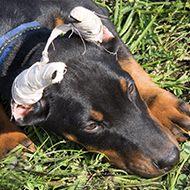
Supporters encouraged to “keep the pressure on decision makers.”
The British Veterinary Association (BVA) and The FOAL Group are calling on the government to take immediate legislative action on ear cropping, after a joint petition from the two groups surpassed 100,000 signatures.
The petition reached the 100,000 signatures milestone in less than two months after its launch. The Petitions Committee considers all petitions that have crossed the 100,000 mark for debate in parliament.
Defra responded to the petition last month, expressing its commitment to working with the #CutTheCrop and #FlopNotCrop campaign to close all legal loopholes that allow ear cropping to continue.
Plaid Cymru MP Liz Saville Roberts has also tabled an Early Day Motion in Parliament, calling on the Government to ban the importation of dogs with cropped ears.
BVA senior vice president Daniella Dos Santos said: “We hope to see legislation on this issue soon. With less than a month to go to the Queen’s Speech, all eyes will now be on the government to see if it has taken note of how passionately people feel about calling time on this barbaric trend.”
FOAL Group co-founder Jordan Shelley reminded supporters that the petition – which has been backed by members of the Veterinary Animal Welfare Coalition – doesn't close until 24 August.
He added: “We urge everyone to keep the pressure on decision makers by continuing to push for further signatures and use this time as an opportunity to further educate the public about the barbaric practice of ear cropping. Together we can stop the awful rise in the number of ear-cropped dogs in the UK.”
The petition, ‘Stop the rising number of ear-cropped dogs in the UK’, and the Government’s written response to it, can be viewed here.



 The Veterinary Medicines Directorate (VMD) is inviting applications from veterinary students to attend a one-week extramural studies (EMS) placement in July 2026.
The Veterinary Medicines Directorate (VMD) is inviting applications from veterinary students to attend a one-week extramural studies (EMS) placement in July 2026.